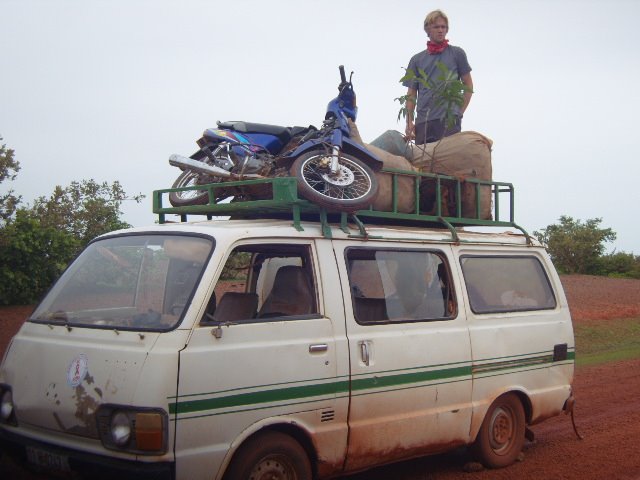Eight months and one day after arriving in Ghana, I finally became ill. By this point, one of my fellow PC group members has suffered from Malaria, Giardia, amoebas and salmonilla. Many others have been hospitalized. I woke up at my normal time of 6:30 and wasn't feeling well so I told Stephen and Dorothy that I'd sleep a bit longer. I took my temperature and it was only at 98.8.
Luckily, I had a nearly full ipod battery so I laid back and watched a few episodes of Sopranos while I continued to feel worse. At 9:30, my fever was over 101 so I thought I drink some green tea. While boiling water, a few Bormase locals came to use the phone. Neither of them spoke English particularly well but they thought it would be a good time to offer me a Dangme lesson.
-Onge saminya lo? (Are you doing well?) This is a standard greeting.
-Ooho, I be nge saminya. (No, I not doing well) Garbled response.
-No, you say 'inga saminya.' It means 'I am well.'
-I understand but I don't feel well. I am not sure the best way to respond to you.
-Oh, not English. You have to learn Krobo. Are you agree?
-Yes, I agree. I don't feel well. How do I say that in Krobo?
After he and I repeated the proper way to say "I'm feeling ill" e be ye wam? ( still don't remember) he left me alone.
The longer I felt ill, the more respect I had for my fellow volunteers who are perpetually ill. I wasn't feeling very patient and wasn't in the mood for an impromptu Krobo lesson.
I decided to fall ill on the day that insecticided was sprinkled in the latrine. Not only did my weak legs have to support my squatting body MANY times throughout the day, I had to deal with spastic flies darting back and forth trying to stay alive despite the poison they've just been fed. On one occasion, a huge cockroach fell from the ceiling onto my back while I was mid-business. I suddenly hoped I was back at my impromptu Krobo lesson.
Luckily, my Mom sent me a can of chicken noodle soup several months back. I have kept it for this particular occasion and it was SO good. Comfort food is so nice when you're sick and I really wasn't in the mood for Fufu or Banku. When Dorothy and Stephen asked me what I had eaten, I explained that I cooked a can of soup. I then went into details of how pre-prepared soup is put in a can and you can simply heat it and eat it. I then went on to describe a microwave and the variety of pre-packaged meals available in America and other countries. When dinner is typicall pounded for fifteen minutes with a 6 foot wooden pole or stirred with a five foot wooden spoon for a half hour, a microwave dinner must sound pretty strange.
My ipod battery lasted for most of 4 episodes (my brain couldn't follow "Zen and the Art of Motorcyvle Maintenance,") of the Sopranos and I spent the rest of the day watching my fever vary from 100 up to 102.8. I read the Peace Corps issued "Where there is no Doctor," to see if I had Malaria, Dysentary or Typhus but after a long night sleep I was feverless and feeling great in the morning.
My Bormase family treated me very well while I was ill which was a great comfort but nothing compared to the feeling of being bundled up in front of the TV with my real mom taking care of me.
Love to all!
Thursday, May 22, 2008
Subscribe to:
Post Comments (Atom)





1 comment:
Hi Ira,
I really enjoyed reading your blog. I work at the Hesperian Foundation which publishes "Where There is No Doctor" which I believe the Peace Corps issues to every volunteer. I'm glad to read that you have been able to use it in the field.
I wanted to let you know that we have many other books available covering issues like HIV, water and sanitation, women's health, disabilities and environmental health, to name a few. Like "Where There is No Doctor", all our books are designed to be accessible (language, content, format) to communities in developing countries, particularly rural areas. Hesperian's books have also been translated in over 80 languages.
Since Hesperian is committed to the principle of healthcare for all, nearly all of our titles (English version) are available online to view or download for free. We also have the Gratis program which sends Hesperian books for free to poor communities that request them. If you are looking to start a library, train community health workers, start a health workshop or just need more information on health issues, you can request specific Hesperian books from the Gratis program. Although technically the request needs to come from the villagers, we send a lot of books to villages that Peace Corps volunteers work in. In fact, the woman in charge of the Gratis program was a Peace Corps volunteer in Ethiopia in the 1960s. We also get the largest number of Gratis requests from Ghana. You can find out more information from www.hesperian.org.
I hope this is useful to you and your work. Good luck!
-Crystal
Post a Comment